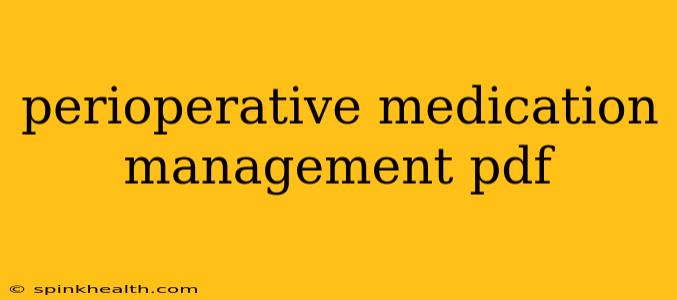Perioperative medication management is a critical aspect of ensuring patient safety and optimal surgical outcomes. It's a complex process involving careful planning, precise execution, and vigilant monitoring, spanning the preoperative, intraoperative, and postoperative phases. This isn't just about administering drugs; it's about understanding their effects, potential interactions, and how they influence the patient's overall condition before, during, and after surgery. Let's delve into the intricacies of this crucial area of healthcare.
What are the key components of perioperative medication management?
Perioperative medication management encompasses a holistic approach, encompassing several critical components:
-
Preoperative Assessment: This crucial first step involves a thorough review of the patient's medical history, including allergies, current medications (prescription and over-the-counter), and any relevant medical conditions. This helps identify potential drug interactions and risks. The surgeon and anesthesiologist collaborate to determine which medications need to be continued, stopped, or adjusted before surgery.
-
Medication Reconciliation: This process is vital to preventing medication errors. It involves comparing the patient's medication list with the physician's orders to ensure accuracy and identify any discrepancies. This is particularly crucial for patients taking multiple medications.
-
Intraoperative Medication Administration: This phase is characterized by precise medication administration under the close supervision of the anesthesiologist. This includes administering anesthetics, analgesics, and other drugs necessary to maintain the patient's hemodynamic stability and comfort during the procedure.
-
Postoperative Pain Management: Effective postoperative pain management is essential for patient comfort and recovery. This often involves a multimodal approach, utilizing a combination of analgesics, such as opioids, NSAIDs, and regional anesthesia techniques. Regular pain assessments are key to optimizing pain relief.
-
Discharge Medication Planning: Before discharge, the healthcare team reviews the patient's medication regimen, making adjustments as needed based on their postoperative condition and recovery progress. Clear instructions are provided to the patient and their caregiver to ensure adherence.
What medications are commonly used in perioperative management?
A wide range of medications are utilized during the perioperative period, depending on the specific needs of the patient and the type of surgery. Common categories include:
-
Analgesics: These medications manage pain, ranging from mild NSAIDs (like ibuprofen or naproxen) to potent opioids (like morphine or fentanyl). The choice depends on the severity of pain and the patient's risk factors.
-
Anesthetics: These drugs induce loss of sensation and consciousness. They can be general anesthetics (affecting the entire body) or regional anesthetics (affecting a specific area).
-
Antibiotics: These are administered prophylactically to prevent surgical site infections (SSIs). The choice of antibiotic depends on the type of surgery and the patient's risk factors.
-
Antiemetics: These medications prevent nausea and vomiting, common side effects of anesthesia and surgery.
-
Benzodiazepines: These drugs are used for their anxiolytic and sedative properties to reduce anxiety and promote relaxation before and after surgery.
What are the common risks and complications associated with perioperative medication management?
Despite careful planning, risks and complications can still occur. These include:
-
Medication errors: These can range from incorrect dosage to administering the wrong medication.
-
Adverse drug reactions: These can vary in severity, from mild allergic reactions to life-threatening anaphylaxis.
-
Drug interactions: The interaction between multiple medications can lead to unexpected and potentially harmful effects.
-
Postoperative nausea and vomiting (PONV): This is a common complication, especially after certain types of surgery.
-
Postoperative pain: Inadequate pain management can lead to prolonged discomfort, delayed recovery, and increased risk of complications.
How can perioperative medication errors be prevented?
Preventing medication errors requires a multi-faceted approach, including:
-
Standardized protocols: Implementing clear guidelines and protocols for medication administration.
-
Medication reconciliation: Accurately documenting and verifying the patient's medication list.
-
Technology: Utilizing electronic health records (EHRs) and barcoding systems to improve accuracy.
-
Teamwork: Encouraging open communication and collaboration among healthcare professionals.
-
Regular education and training: Keeping staff updated on best practices and current guidelines.
What is the role of the patient in perioperative medication management?
Patients play a crucial role in safe perioperative medication management. This includes:
-
Providing accurate information: Patients should provide a complete and accurate medication history, including over-the-counter drugs and supplements.
-
Asking questions: Don't hesitate to ask questions about your medications and any potential side effects.
-
Reporting side effects: Promptly report any adverse reactions or unexpected symptoms to your healthcare team.
Perioperative medication management is a complex and multifaceted process, requiring a collaborative effort among healthcare professionals and active patient participation. By following best practices, prioritizing patient safety, and using technology where appropriate, we can significantly minimize the risk of complications and promote the best possible surgical outcomes.

